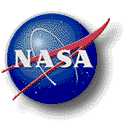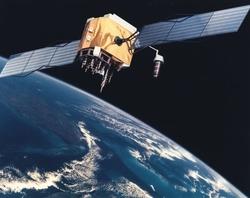ESA Working To Compete With NASA
 So, your toodling along in your
space suit, having a great time on your first EVA, when suddenly,
incredibly, someone taps you on the shoulder. Recognize that
scared, sick, sinking feeling in your stomach?
So, your toodling along in your
space suit, having a great time on your first EVA, when suddenly,
incredibly, someone taps you on the shoulder. Recognize that
scared, sick, sinking feeling in your stomach?
Pehaps the folks at NASA do. Europe, which has been catching up
with -- and in some cases, surpassing -- the US in technology
fields, has now set its collective sights on space.
Move Over GPS. Here Comes Galileo
Back in May, the European Space Agency funded a
project called "Gallileo." It's the European version of the Global
Positioning Satellite System. Made in Europe.
 The GPS system was built by the
military a quarter-century ago. Its good graces guide pilots to
their destinations. Its super-accurate clocks guide banks and big
business through complicated financial transactions. But in spite
of all that, the GPS system is a military system and some analysts
consider it vulnerable.
The GPS system was built by the
military a quarter-century ago. Its good graces guide pilots to
their destinations. Its super-accurate clocks guide banks and big
business through complicated financial transactions. But in spite
of all that, the GPS system is a military system and some analysts
consider it vulnerable.
Gallileo will be run by civilians. It will be tailored to
civilian needs. The Europeans say it will cover more territory with
greater continuity than GPS.
"The United States could end up ceding leadership in civil
navigation to Europe," said Jeffrey Bialos, former head of the U.S.
delegation for negotiations on GPS and Galileo and an official at
the Pentagon under the Clinton administration, in an interview with
Reuters.
Bad Blood
At first glance, the Gallileo system and GPS look a
lot alike. In fact, the Defense Department is worried that Gallileo
will broadcast on the same frequencies as GPS. The United States
has accused Europe of unnecessarily duplicating a system that's
already in place and doing just fine, thanks.
But that's not the way Europe sees it. French President Jacques
Chirac says European countries would become "vassals" of the United
States without their own satellite-based navigation system. There
are even concerns that the US could jam GPS signals, a worry that
was exacerbated by differences over the war in Iraq.
 "The war in Iraq underscored
how weak Europe is in using space applications for defense and
security purposes," said European Research Commissioner Philippe
Busquin, speaking in Paris at the end of June. "We need to give the
European Union a high degree of independence in the space arena.
The sovereignty of our continent is at stake."
"The war in Iraq underscored
how weak Europe is in using space applications for defense and
security purposes," said European Research Commissioner Philippe
Busquin, speaking in Paris at the end of June. "We need to give the
European Union a high degree of independence in the space arena.
The sovereignty of our continent is at stake."
Them's tough words, pardner. While Gallileo is
a system built for civilians and manned by civilians, don't kid
yourself. There's a military application in there somewhere.
"Galileo is positioned as civilian but could easily evolve to
become strategic," said David Braunschvig, a managing director at
Lazard in New York and an adjunct senior fellow at the Council on
Foreign Relations, who co-authored a recent article in Foreign
Affairs magazine on Galileo and GPS.
Gallileo Is One Thing. There's Much More
Evidence of a general fallout between continents is
clear elswhere in the skies above. Germany, unhappy with
US-provided satellite imagery during the Kosovo conflict, has
decided to build its own system of radar-imaging satellites, one
that would compliment a constellation already put in orbit by the
French. Earlier this year, EU members promised $1.1 billion to make
the Ariane-5 launch system more competitive with those of the
United States.
European space initiatives come as China promises to send a man
to the moon. The Pentagon is certainly worried. In 2001, the Space
Commission, run by Defense Secretary Donald Rumsfeld, warned that
the United States is open to a "Pearl Harbor" space attack. The
Space Commission urged the government to do whatever it takes to
stay on top in the race for space.
If this trend continues, we're gonna need a traffic cop up
there.
 Aero-TV: DeltaHawks Diesel Power Steps Into the Spotlight
Aero-TV: DeltaHawks Diesel Power Steps Into the Spotlight NTSB Prelim: Mooney Aircraft Corp. M20K
NTSB Prelim: Mooney Aircraft Corp. M20K ANN FAQ: Turn On Post Notifications
ANN FAQ: Turn On Post Notifications ANN's Daily Aero-Linx (12.20.25)
ANN's Daily Aero-Linx (12.20.25) Aero-News: Quote of the Day (12.20.25)
Aero-News: Quote of the Day (12.20.25)





